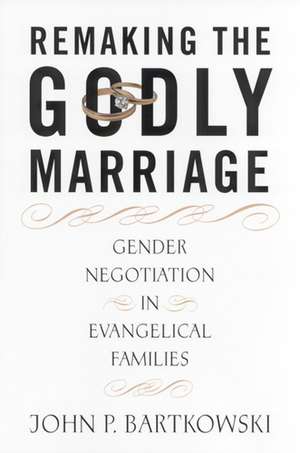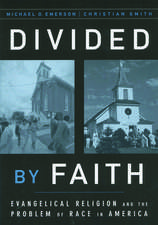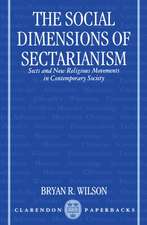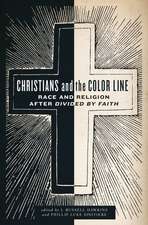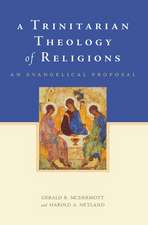Remaking the Godly Marriage: Gender Negotiation in Evangelical Families
Autor John Bartkowskien Limba Engleză Paperback – iun 2001
While religious leaders often have enormous influence over their members’ beliefs and how they translate their beliefs into action in everyday life, the individual family remains the place where religious values are practiced through and ultimately transferred to the next generation. As such, the family is an extremely important, though frequently overlooked, topic of study for sociologists of religion.
In Remaking the Godly Marriage, John Bartkowski studies evangelical Protestants and their views on marriage and gender relations and how they are lived within individual families. The author compares elite evangelical prescriptions for godly family living with the day-to-day practices in conservative Protestant households. He asks: How serious are the debates over gender and the family that are manifested within contemporary evangelicalism? What are the values that underlie this debate? Have these internecine disputes been altered by the emergence of new evangelical movements such as biblical feminism and the Promise Keepers? And given the fact that leading evangelicals advance competing visions of godly family life, how do conservative religious spouses make sense of their own family relationships and gender identities?
Through in-depth interviews with evangelical married couples and an exhaustive study of evangelical family advice manuals, Bartkowski explores the disputes and ambivalence concerning traditional gender roles and patriarchal models of family life, which derive from the tension between evangelical Protestantism as a religious subculture and the broader American secular culture in which it is embedded. Bartkowski reveals how evangelical men and women jointly negotiate gender roles within their families and selectively appropriate values of the larger culture even as they attempt to cope with the conflicting messages of their own faith.
In Remaking the Godly Marriage, John Bartkowski studies evangelical Protestants and their views on marriage and gender relations and how they are lived within individual families. The author compares elite evangelical prescriptions for godly family living with the day-to-day practices in conservative Protestant households. He asks: How serious are the debates over gender and the family that are manifested within contemporary evangelicalism? What are the values that underlie this debate? Have these internecine disputes been altered by the emergence of new evangelical movements such as biblical feminism and the Promise Keepers? And given the fact that leading evangelicals advance competing visions of godly family life, how do conservative religious spouses make sense of their own family relationships and gender identities?
Through in-depth interviews with evangelical married couples and an exhaustive study of evangelical family advice manuals, Bartkowski explores the disputes and ambivalence concerning traditional gender roles and patriarchal models of family life, which derive from the tension between evangelical Protestantism as a religious subculture and the broader American secular culture in which it is embedded. Bartkowski reveals how evangelical men and women jointly negotiate gender roles within their families and selectively appropriate values of the larger culture even as they attempt to cope with the conflicting messages of their own faith.
Preț: 288.69 lei
Nou
Puncte Express: 433
Preț estimativ în valută:
55.25€ • 59.99$ • 46.41£
55.25€ • 59.99$ • 46.41£
Carte tipărită la comandă
Livrare economică 23 aprilie-07 mai
Preluare comenzi: 021 569.72.76
Specificații
ISBN-13: 9780813529196
ISBN-10: 0813529190
Pagini: 210
Dimensiuni: 152 x 229 x 15 mm
Greutate: 0.37 kg
Ediția:None
Editura: Rutgers University Press
Colecția Rutgers University Press
ISBN-10: 0813529190
Pagini: 210
Dimensiuni: 152 x 229 x 15 mm
Greutate: 0.37 kg
Ediția:None
Editura: Rutgers University Press
Colecția Rutgers University Press
Notă biografică
John P. Bartkowski is an assistant professor in the department of sociology, anthropology, and social work at Mississippi State University.
Cuprins
PART 1 Introduction and background.
1 Evangelical family life and America's culture wars
2 Evangelical families in historical perspective
PART 2 Contemporary conservative Protestant gender discourse : elite evangelical prescriptions for family life
3 Discourses of masculinity, femininity, and sexuality : evangelical debates over gender difference
4 Wifely submission or mutual submission? : evangelical discourses of family power
5 Separate spheres or domestic task sharing? : evangelical debates over financial provision, housework, and child care
PART 3 Tandem gender : negotiation among evangelical spouses
6 Vive la difference? : gender difference in family ministry and domestic life
7 Negotiating patriarchy : submission, subversion, and family power
8 Labor of love? : financial provision, housework, and child care
CONCLUSION Refashioning evangelical families for the twenty-first century : godly marriages in a millennial age
1 Evangelical family life and America's culture wars
2 Evangelical families in historical perspective
PART 2 Contemporary conservative Protestant gender discourse : elite evangelical prescriptions for family life
3 Discourses of masculinity, femininity, and sexuality : evangelical debates over gender difference
4 Wifely submission or mutual submission? : evangelical discourses of family power
5 Separate spheres or domestic task sharing? : evangelical debates over financial provision, housework, and child care
PART 3 Tandem gender : negotiation among evangelical spouses
6 Vive la difference? : gender difference in family ministry and domestic life
7 Negotiating patriarchy : submission, subversion, and family power
8 Labor of love? : financial provision, housework, and child care
CONCLUSION Refashioning evangelical families for the twenty-first century : godly marriages in a millennial age
Recenzii
Bartkowski draws from a treasure trove of stories to make evangelists understand able and alive. Like everyone else, they struggle to to create workable ways of being men, women, and families in a changing world.
Bartkowski very nicely mixes methods - combining an analysis of evangelical advice manuals, an ethnography of an evangelical congregation, and in-depth interviews with married evangelical couples - to produce an important contribution to our growing understanding of the complexity, ambivalence, and diversity within American evangelicalism.
Using a deft combination of historical material, textual analysis, interviews and ethnographic observation, Bartkowski unpacks the multiple discourses about, and practices within, marriage and families among evangelical Protestants.
Bartkowski very nicely mixes methods - combining an analysis of evangelical advice manuals, an ethnography of an evangelical congregation, and in-depth interviews with married evangelical couples - to produce an important contribution to our growing understanding of the complexity, ambivalence, and diversity within American evangelicalism.
Using a deft combination of historical material, textual analysis, interviews and ethnographic observation, Bartkowski unpacks the multiple discourses about, and practices within, marriage and families among evangelical Protestants.
Descriere
In Remaking the Godly Marriage, John Bartkowski studies evangelical Protestants and their views on marriage and gender relations and how they are lived within individual families. The author compares elite evangelical prescriptions for godly family living with the day-to-day practices in conservative Protestant households. He asks: How serious are the debates over gender and the family that are manifested within contemporary evangelicalism? What are the values that underlie this debate? Have these internecine disputes been altered by the emergence of new evangelical movements such as biblical feminism and the Promise Keepers? And given the fact that leading evangelicals advance competing visions of godly family life, how do conservative religious spouses make sense of their own family relationships and gender identities?
